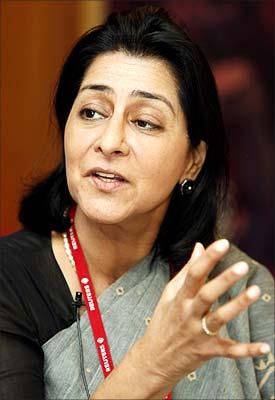
Naina Lal Kidwai, Country Head, HSBC India and the first Indian woman to have graduated from the Harvard Business School, in 1982 speaks about the importance of hard work, women in IIM classrooms and more.
An Economics graduate from Lady Shri Ram College for Women, Delhi, Naina Lal Kidwai went on to become the first Indian woman to graduate from the Harvard University.
Currently, the country head of HSBC India, Kidwai has featured in various magazines including the Fortune global list of Top Women in Business.
She was ranked 12th in the Wall Street Journal 2006 Global Listing of Women to Watch out for and by Time magazine as one of their 15 Global Influentials 2002. In 2007, she received the Padma Shri for her contribution in the promotion of Trade and Industry.
In this interview Naina Lal Kidwai talks about the continuous need to learn from your surroundings, why the criteria of MBA admissions should be revised to encourage more women and the skills she qualities she admires in young professionals.What are the five qualities that you have come to admire in people at the workplace throughout your career?
I think first and foremost, it's persistence or the never-say-die spirit.
That means persistence in getting the job done, persistence in excelling and persistence in not getting down-and-out when things go wrong. Second would be team-play.
You need to recognise that you cannot do everything yourself, you need to have people with you and around you so that when you identify something you do not know you can turn to them.
The third would be the ability to continue getting trained academically and to do it right. There should be the ability to not just learn and know, but to continuously learn.
The fourth would be humility so that you are humble enough to recognise what you do not know so that you keep learning.
If you are humble, you also make for a team player. Last, but as important as the rest would be integrity. You need to do everything with spirit so that you live by principles.
Click NEXT to continue reading

What are the qualities that you do not appreciate in managers, something you would advise young people against?
All the people who do not work hard, who do not believe in team-play and who do not believe in continuously working should be careful.
The biggest danger is when you have just got a degree and you think you know it all. Actually, everything you learn is outdated by almost six months to a year in this time of change.
To continuously learn is very important and your degree is a passport to learn everything that is important. Your mind should have the agility to learn. You never stop.
Back when I did my degree from Harvard in 1982, so little of the actual learning (I did then) is relevant today but the tools, the way it continuously equips you to learn has stayed.
What such tools have proved to be the most effective in your life?
The ability to have a lot of data thrown at you but the ability to distil it into some sense, the ability to analyse, the ability to articulate that analysis, the confidence in your own ability to do all those things are the tools that you learn and which stay with you forever.
What according to you is the one most valued quality in young managers today?
With different kids, it is different. Each brings a phenomenal amount of intellect and passion. What I find most attractive is the wonderful energy that kids have on joining. I would give very high points to attitude while assuming a base level of intellect.
Illustration: Dominic Xavier

The Indian Institutes of Management (IIMs) and other top B-schools have been relaxing their admission criteria to accommodate more women. Your views?
The downside of having a quota is that it makes it appear as if it is not your merit. I think it's not so much a problem with a quota, as it is with the fact that the IIMs have to address why they don't have more women joining the management field.
I think the answer lies in the fact that because the criteria are very IIT and CAT oriented, the IIMs attracts a certain kind of candidate. So the criteria, which I don't think are right, is what begins the discrimination.
I don't think you should look at quotas, you should look at what is not working and why it is not working. You should analyse why it is that women, who constitute a good number of students these days, are not coming to the field of management.
By resetting that, you begin to understand what is wrong and what needs to be changed.
While I was on the dean's advisory board at the Harvard Business School, it had turned out that the average age of people joining management institutes had become 28-29 years in place of 25-26 earlier. Women at the age of 28-29 found it quite hard to come to study.
They may have married, they may have children, there may be umpteen reasons that stop them from joining. So the institute had to drop the age requirements in order to get more women.
You need to understand that the minute you put a specification, like having a 4-5 years work experience it becomes a discrimination of sorts because it ensures that people who could be eligible otherwise would not come through.
We have to rethink who we admit. I would not call it a quota, but a criteria for admissions. It needs to be broad-based so that you don't get one uniform type of person coming through and every kid who graduates is just from the engineering background.

More number of Indians today seem open to the idea of studying an MBA abroad. Your comments?
The issue here is of the quality of what we offer. Few b-schools here have got it all.
It was wonderful to see these last Financial Times rankings where we have two Indian b-schools in the top 20, which is excellent. But we need more on that list. Also, every one of those kids who goes offshore, goes because he does not get an admission here in the top schools.
They do not go only because they want to go. It is tougher to get admission in an IIM than it is to get admission offshore. Otherwise why would you not spend lesser and do and MBA here?
I just think we need more schools of a high calibre and be able to ensure that all our kids get good quality education. I chaired the Indian Advisory Board for Harvard Business School where the research centre is writing case studies on India.
Why would you want to go all the way to the US to write cases on India when you could do it here? So we really need more schools here who can teach at the level we would like them to.
Under your leadership, HSBC has taken to microfinance in a big way. What is the scope of work that youngsters can look forward to by joining this sector?
Microfinance fills a very important gap for the country because it is all about rural and financial inclusion.
Not just rural, but banks have not been able to successfully cover urban areas too. So only 50 percent of Indians have bank accounts, which includes the microfinancial accounts as well.
There have been problems along the way, for instance the rates of interest were much too high or there was too much aggressive lending which would mean that one person had taken four loans when really they could only repay one. Those are the things which need to be corrected. But these things do not make microfinance bad.
Microfinance has been such a critical provider of finance. That finance can sometimes go into business for women who can borrow to do embroidery, buy a cow, buy chickens, which then brings them the ability to repay the loans and help save money.
This is the ideal situation and microfinance provides that today because banks have seriously failed in that sector (through mainstream banking products). So we need a viable microfinance sector and we need it to be regulated.
Young managers can help out by understanding this core concept and bringing in fresh ideas to make this sector work in the best possible manner.
There is apprehension among youngsters today about entering a b-school because of the uncertain job market...
It is not just on an Indian level but globally the situation has seen a setback. The best we can do is sit back and wait it out. I do not think that management students should be worried. This should pass soon.
Illustration: Dominic Xavier